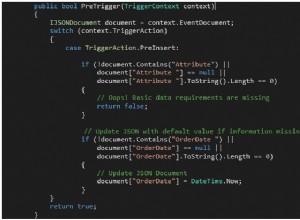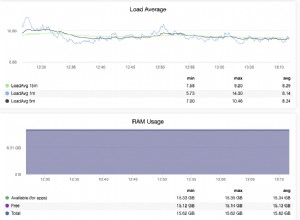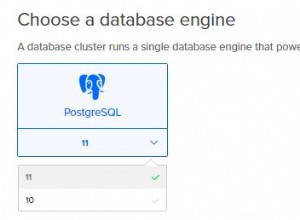La mia risposta è un aggiornamento della risposta di @santosh. Sto incorporando tutte le migliori pratiche descritte qui:
- https://www.percona .com/blog/2014/12/19/store-uuid-optimized-way/
- https://mysqlserverteam.com/storing-uuid-values -in-mysql-tables/
Sto usando il simple_uuid gem perché può generare UUID "v1". SecureRandom.uuid integrato in Ruby genera v4. Abbiamo bisogno della v1, perché è ciò che incorpora il timestamp come parte dell'UUID. Leggi i link sopra per avere una comprensione più profonda. UUID() di MySQL la funzione genera UUID v1.
app/models/concerns/binary_uuid_pk.rb
module BinaryUuidPk
extend ActiveSupport::Concern
included do
before_validation :set_id, on: :create
validates :id, presence: true
end
def set_id
uuid_object = SimpleUUID::UUID.new
uuid_string = ApplicationRecord.rearrange_time_of_uuid( uuid_object.to_guid )
uuid_binary = ApplicationRecord.id_binary( uuid_string )
self.id = uuid_binary
end
def uuid
self[:uuid] || (id.present? ? ApplicationRecord.format_uuid_with_hyphens( id.unpack('H*').first ).upcase : nil)
end
module ClassMethods
def format_uuid_with_hyphens( uuid_string_without_hyphens )
uuid_string_without_hyphens.rjust(32, '0').gsub(/^(.{8})(.{4})(.{4})(.{4})(.{12})$/, '\1-\2-\3-\4-\5')
end
def rearrange_time_of_uuid( uuid_string )
uuid_string_without_hyphens = "#{uuid_string[14, 4]}#{uuid_string[9, 4]}#{uuid_string[0, 8]}#{uuid_string[19, 4]}#{uuid_string[24..-1]}"
ApplicationRecord.format_uuid_with_hyphens( uuid_string_without_hyphens )
end
def id_binary( uuid_string )
# Alternate way: Array(uuid_string.downcase.gsub(/[^a-f0-9]/, '')).pack('H*')
SimpleUUID::UUID.new( uuid_string ).to_s
end
def id_str( uuid_binary_string )
SimpleUUID::UUID.new( uuid_binary_string ).to_guid
end
# Support both binary and text as IDs
def find( *ids )
ids = [ids] unless ids.is_a?( Array )
ids = ids.flatten
array_binary_ids = ids.each_with_object( [] ) do |id, array|
case id
when Integer
raise TypeError, 'Expecting only 36 character UUID strings as primary keys'
else
array << SimpleUUID::UUID.new( id ).to_s
end
end
super( array_binary_ids )
end
end
end
app/models/application_record.rb
## ApplicationRecord (new parent of all models in Rails 5)
class ApplicationRecord < ActiveRecord::Base
self.abstract_class = true
include BinaryUuidPk
end
Ora, tutti i modelli supporteranno chiavi primarie UUID ottimizzate.
Migrazione di esempio
class CreateUserProfiles < ActiveRecord::Migration[5.0]
def change
create_table :user_profiles, id: false do |t|
t.binary :id, limit: 16, primary_key: true, null: false
t.virtual :uuid, type: :string, limit: 36, as: "insert( insert( insert( insert( hex(id),9,0,'-' ), 14,0,'-' ), 19,0,'-' ), 24,0,'-' )"
t.index :uuid, unique: true
t.string :name, null: false
t.string :gender, null: false
t.date :date_of_birth
t.timestamps null: false
end
execute <<-SQL
CREATE TRIGGER before_insert_user_profiles
BEFORE INSERT ON user_profiles
FOR EACH ROW
BEGIN
IF new.id IS NULL THEN
SET new.id = UUID_TO_BIN(uuid(), 1);
END IF;
END
SQL
end
end
Aggiungi UUID_TO_BIN() funzione al DB MySQL :
DELIMITER //
CREATE FUNCTION UUID_TO_BIN(string_uuid BINARY(36), swap_flag INT)
RETURNS BINARY(16)
LANGUAGE SQL DETERMINISTIC CONTAINS SQL SQL SECURITY INVOKER
RETURN
UNHEX(CONCAT(
SUBSTR(string_uuid, 15, 4),
SUBSTR(string_uuid, 10, 4),
SUBSTR(string_uuid, 1, 8),
SUBSTR(string_uuid, 20, 4),
SUBSTR(string_uuid, 25) ));
//
DELIMITER ;
La funzione di cui sopra è integrata in MySQL 8.0 e versioni successive. Al momento in cui scrivo, 8.0 non è ancora GA. Quindi, per ora aggiungo la funzione. Ma ho mantenuto la firma della funzione uguale a quella presente in MySQL 8.0. Quindi, quando passiamo all'8.0, tutte le nostre migrazioni e trigger continueranno a funzionare.




